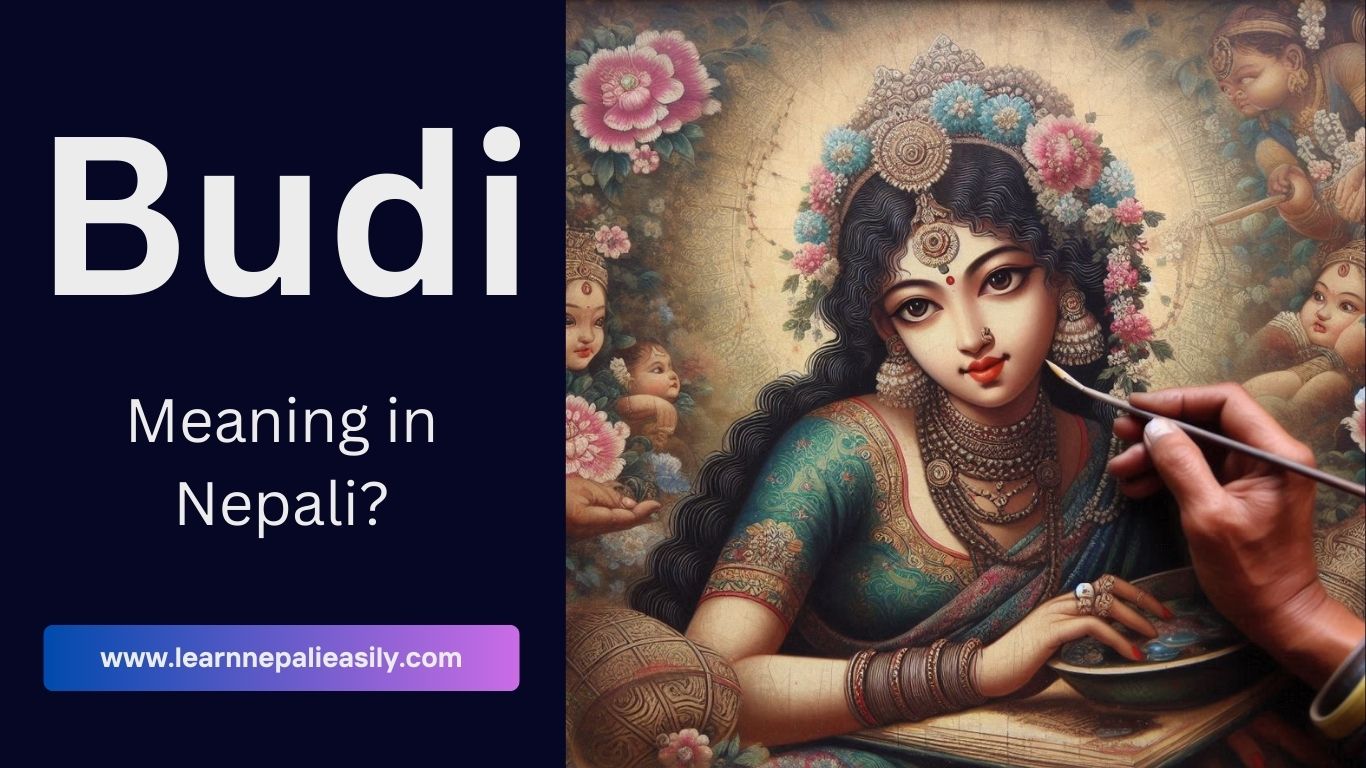Nepali language is filled with affectionate, humorous, and culturally significant terms, and one of these is the term “Budi” (बुढी) . If you’ve ever been around Nepali speakers, you may have heard this term used in various ways, and its meaning often depends on the tone and context in which it is said. This article will explain the different meanings of “Budi” in Nepali, provide example sentences, and explore the cultural nuances of using the term.
What does “Budi” mean in Nepali?
Primary meaning as an elderly woman: “Budi” (बुढी) means an elderly woman in Nepali.
Secondary meaning as ‘wife’: In its most common usage, “Budi” (बुढी) means “wife” or female partner. It’s a casual and slightly humorous way for husbands to refer to their wives. This word is often used affectionately among married couples in Nepal.
Wife = “swasni”, “shreemati”
Mero budi = my wife
Playful or humorous tone: “Budi” is often used in lighthearted, friendly banter. Nepali culture embraces humor, especially in family relationships. So, friends might jokingly refer to a man’s partner as his “Budi” to tease him playfully.
Whether referring to a wife, a loved one, or an elderly woman, “Budi” is considered informal and carries a tone of familiarity.
Example sentences for “Budi” in different formats
Let’s look at some example sentences in English and Nepali script to see how “Budi” is used in different contexts. These sentences will help you understand how this term is applied in day-to-day conversations.
English: His wife is a great cook.
Nepali: Usko budi ramro cook ho. (उसको बुढी राम्रो कुक हो।)
English: Your wife always makes us laugh.
Nepali: Tapaiko budile hamilai sadhai hasaune garchin. (तपाईको श्रीमतीले हामीलाई सधैं हसाउने गर्छिन्। )
English: I saw an elderly woman crossing the street.
Nepali: Maile euti budi aamalai sadak par gariraheko dekhe. (मैले एउटी बुढी आमालाई सडक पार गरिरहेको देखेँ।)
English: Does your wife know about the surprise party?
Nepali: Timro budilai surprise partyko barema thaha cha? (तिम्रो बुढीलाई सरप्राइज पार्टीको बारेमा थाहा छ?)
English: My wife loves to cook Nepali food.
Nepali: Mero budilai Nepali khana pakauna manparchha. (मेरो बुढीलाई नेपाली खाना पकाउन मनपर्छ।)
Cultural context and nuances of “Budi”
The use of “Budi” often depends on context and relationship dynamics. Some key cultural insights include:
Tone of familiarity: The word “Budi” has a tone of intimacy and familiarity, making it a word that husbands commonly use when they feel close or playful with their wives.
Common among friends and family: It’s common to hear “Budi” used among close friends or relatives when joking or teasing. Friends may say, “Your Budi is waiting for you,” to add humor to conversations.
Respect and endearment: While “Budi” is informal, it still carries a sense of affection and respect. However, it may not be suitable for formal settings or with people who are not close.
Dialect variations: Depending on the region, some may use “Budi” strictly to mean an elderly woman, while others may use it only in reference to a wife. Understanding the local dialect helps when interpreting the term.
Conclusion
The term “Budi” in Nepali is more than just a simple word; it reflects the warmth, humor, and cultural nuances within Nepali relationships. While it most commonly refers to an elderly woman, it can also mean “wife” in a playful affectionate way, in certain contexts. Understanding how to use “Budi” correctly enhances your grasp of Nepali language and helps you appreciate the cultural layers behind words and phrases. Whether you’re learning Nepali for communication, travel, or personal connections, familiarizing yourself with such colloquial terms enriches your experience and helps you bond more deeply with Nepali speakers.

